FOCUS
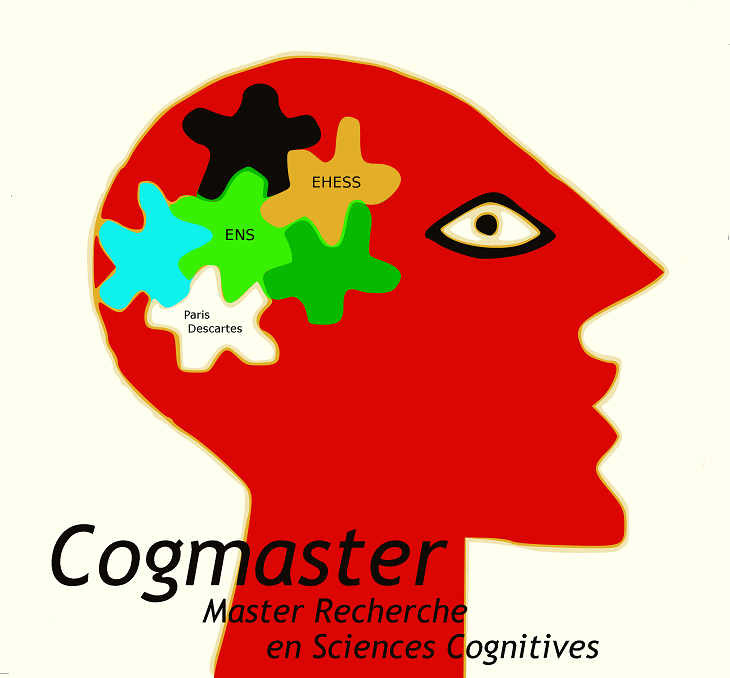
Le master Recherche en Sciences Cognitives (Cogmaster) mis à l'honneur par Le Monde
Le Cogmaster figure parmi les 16 "pépites de l'enseignement supérieur" sélectionnées par
Le Monde dans le supplément Universités et Grandes écoles daté du 23 janvier 2014.
Site internet du journal Le monde:
- "Elargir le champ de la connaissance"
- Article intégral (format pdf).
En savoir plus sur le Cogmaster.
EN BREF
La conscience des nouveau-nés sur France 2

L'émission de France 2, "Télématin", a diffusé un reportage sur la conscience des nouveau-nés le 20 janvier 2014 à 8h15. Sid Kouider (LSCP) a été interviewé à cette occasion.
Retrouvez le reportage sur le site de France 2.
Lire la publication de Sid Kouider et al. A Neural Marker of Perceptual Consciousness in Infants Science 340, 376 (2013). DOI: 10.1126/science.1232509.
LA VIE DU DEPARTEMENT
Les Rois fêtés au Département d'études cognitives
Cette galette des rois a permis de réunir l'ensemble du Département d'études cognitives pour partager un moment convivial dans les locaux de l'administration du DEC, fraichement rénovés.
Cet événement a été l'occasion pour Sharon Peperkamp, nouvelle directrice du Département, de rendre hommage à Christian Lorenzi, son prédécesseur.


LSP: une nouvelle équipe au sein du DEC
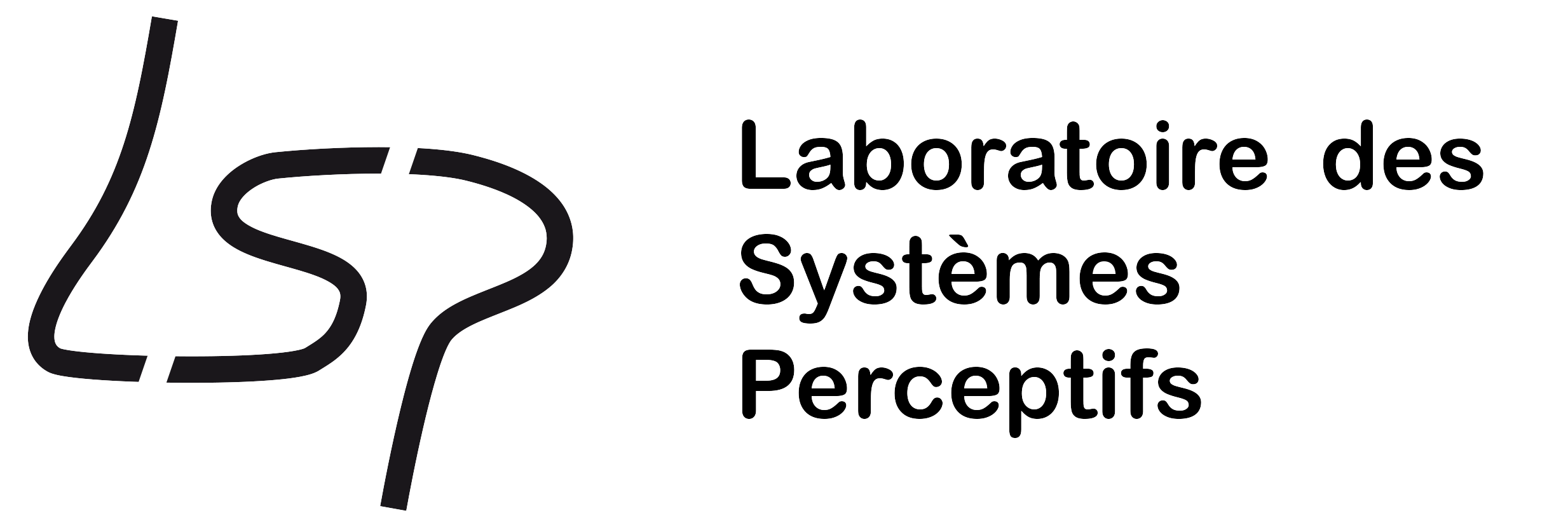
Le Laboratoire des Systèmes Perceptifs (LSP) est une unité de recherche (CNRS UMR 8248) intégrée à l'Institut d’étude
de la cognition (IEC). Les membres de cette unité cherchent à mieux comprendre
les mécanismes sous-jacents à notre perception du monde, avec une emphase sur la vision et l’audition.
Dans cette perspective, ils exploitent des outils de multiples disciplines, en particulier la psychophysique
comportementale, les neurosciences intégratives et la modélisation computationnelle. Parmi les projets récents,
on notera l’étude du codage prédictif, l’analyse de scènes et les traitements sensoriels dynamiques, projets
abordés à la fois d’un point de vue fondamental et appliqué.
Cliquer sur le visuel pour accèder au site internet du LSP (www.iec-lsp.ens.fr):

Le nouveau site internet du Laboratoire de Neurosciences Cognitives (LNC) est en ligne
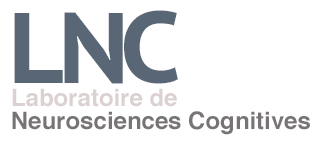
Les sites internet des équipes de recherche du département font l'objet d'une refonte depuis 1 an et demi, sur la base de la charte graphique du DEC.
Les sites des équipes suivantes ont déjà été refondus: Institut Jean Nicod (IJN),
NeuoPsychologie Interventionnelle (NPI), IEC-Ling.
Le site du LNC vient d'être mis en ligne à l'adresse suivante: www.iec-lnc.ens.fr.

FINANCEMENTS
- Action et Perception Sociale dans l'Autisme (Fondation Orange / 2013-2014)
- Vision et Emotion dans l'autisme (Fondation de France / 2014-2016)
- InFOR-Autism (Fondation FondaMental / 2013-2016)
QUELQUES PUBLICATIONS RECENTES
Cauvet, E., Limissuri, R., Millotte, S., Skoruppa, K., Cabrol, D. & Christophe, A. (2014). Functions Words Constrain On-Line Recognition of Verbs and Nouns in French 18-month-olds.
Language Learning and Development, 10, 1-18.
Abstract
In this experiment using the conditioned head-turn procedure, 18-month-old French-learning toddlers were trained to respond to either a target noun (“la balle”/the ball) or a target verb (“je mange”/I eat). They were then tested on target word recognition in two syntactic contexts: the target word was preceded either by a correct function word (“une balle”/a ball or “on mange”/they eat), or by an incorrect function word, signaling a word from the other category (*“on balle”/they ball or *“une mange”/a eat). We showed that 18-month-olds exploit the syntactic context on-line to recognize the target word: verbs were recognized when preceded by a personal pronoun but not when preceded by a determiner and vice-versa for nouns. These results suggest that 18-month-olds already know noun and verb contexts. As a result, they might be able to exploit them to categorize unknown words and constrain their possible meaning (nouns typically refer to objects whereas verbs typically refer to actions).
Paul Egré, Vincent de Gardelle, David Ripley(Dec. 2013) Vagueness and Order Effects in Color Categorization
Abstract:
This paper proposes an experimental investigation of the use of vague predicates in dynamic sorites. We present the results of two studies in which subjects
had to categorize colored squares at the borderline between two color categories (Green vs. Blue, Yellow vs. Orange). Our main aim was to probe for
hysteresis in the ordered transitions between the respective colors, namely for the longer persistence of the initial category. Our main finding is
a reverse phenomenon of enhanced contrast (i.e. negative hysteresis), present in two different tasks, a comparative task involving two color names,
and a yes/no task involving a single color name, but not found in a corresponding color matching task. We propose an optimality-theoretic explanation
of this effect in terms of the strict-tolerant framework of Cobreros et al. (J Philos Log 1–39, 2012), in which borderline cases are characterized
in a dual manner in terms of overlap between tolerant extensions, and underlap between strict extensions.
Moll, K., Ramus, F., Bartling, J., Bruder, J., Kunze, S., Neuhoff, N., . . . Landerl, K. (2014). Cognitive mechanisms underlying reading and spelling development in five European orthographies.
Learning and Instruction, 29, 65-77
Abstract:
This paper addresses the question whether the cognitive underpinnings of reading and spelling are universal or language/orthography-specific. We analyzed concurrent predictions of phonological
processing (awarness and memory) and rapid automatized naming (RAN) for literacy development in a large european sample of 1062 typically developing elementary school
children beyond Grade 2 acquiring five different alphabetic orthographies with varying degrees of grapheme-phoneme consistency (English, French, German, Hungarian, Finnish). Finfings indicate
that (1) phonological processing and RAN both account for significant amounts of unique variance in literacy attainment in all five orthographies. Associations of predictors
with reading speed, reading accuracy, and spelling are differential: in general, RAN is the best predictor of reading speed while phonological processing accounts for higher amounts
of unique variance in reading accuracy and spelling; (2) the predictive patterns are largely comparable across orthographies, but they tend to be stronger in English than in all other orthographies.
Skoruppa, K., N. Mani, K. Plunkett, D. Cabrol, & S. Peperkamp (2013). Early word recognition in sentence context: French and English 2-year-olds' sensitivity to
sentence-medial mispronunciations and assimilations. Infancy, 18, 1007-1029.
Abstract:
Recent work has shown that young children can use fine phonetic detail during the recognition of isolated and sentence-final words from early in lexical development. The present study investigates 24-month-olds' word
recognition in sentence-medial position in two experiments using an Intermodal Preferential Looking paradigm. In Experiment 1, French toddlers detect word
-final voicing mispronunciations (e.g., buz [byz] for bus [bys] “bus”), and they compensate for native voicing assimilations (e.g., buz devant toi [buz
dəvɑ̃twa] “bus in front of you”) in the middle of sentences. Similarly, English toddlers detect word-final voicing mispronunciations (e.g., sheeb for sheep)
in Experiment 2, but they do not compensate for illicit voicing assimilations (e.g., sheeb there). Thus, French and English 24-month-olds can take into account
fine phonetic detail even if words are presented in the middle of sentences, and French toddlers show language-specific compensation abilities for pronunciation
variation caused by native voicing assimilation.
Tiziana Zalla and Marco Sperduti. Front Hum Neurosci. 2013; 7: 894. The amygdala and the relevance detection theory of autism: an evolutionary perspective.
Abstract:
In the last few decades there has been increasing interest in the role of the amygdala in psychiatric disorders and, in particular, in its contribution to
the socio-emotional impairments in autism spectrum disorders (ASDs). Given that the amygdala is a component structure of the “social brain,” several
theoretical explanations compatible with amygdala dysfunction have been proposed to account for socio-emotional impairments in ASDs, including abnormal
eye contact, gaze monitoring, face processing, mental state understanding, and empathy. Nevertheless, many theoretical accounts, based on the Amygdala
Theory of Autism, fail to elucidate the complex pattern of impairments observed in this population, which extends beyond the social domain. As posited
by the Relevance Detector theory (Sander et al., 2003), the human amygdala is a critical component of a brain circuit involved in the appraisal of
self-relevant events that include, but are not restricted to, social stimuli. Here, we propose that the behavioral and social–emotional features of
ASDs may be better understood in terms of a disruption in a “Relevance Detector Network” affecting the processing of stimuli that are relevant for the
organism’s self-regulating functions. In the present review, we will first summarize the main literature supporting the involvement of the amygdala in
socio-emotional disturbances in ASDs. Next, we will present a revised version of the Amygdala Relevance Detector hypothesis and we will show that this
theoretical framework can provide a better understanding of the heterogeneity of the impairments and symptomatology of ASDs. Finally, we will discuss
some predictions of our model, and suggest new directions in the investigation of the role of the amygdala within the more generally disrupted cortical
connectivity framework as a model of neural organization of the autistic brain.
COLLOQUIUM DE L'IEC/DEC
Salle Langevin, 29 rue d'Ulm, 75005 Paris, les mardis de 12h à 13h30.
Retrouvez le programme du Colloquium sur le site du DEC/IEC.
AGENDA
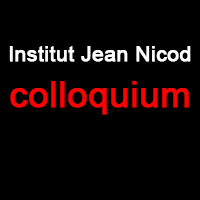
7 février 2014
Colloquium de l'Institut Jean Nicod
David Papineau (Professor of Philosophy of Science, King's College London): "A Priori Intuitions: Analytic or Synthetic?"
En savoir plus...
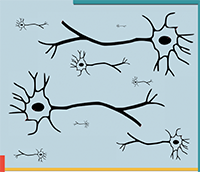
10 février 2014
DEC-IBENS Neuro Day
Voir le programme
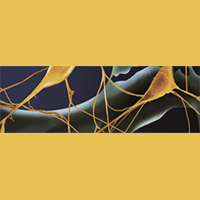
25 février 2014
Colloquium de l'IEC
Zoltan Dienes - Titre à venir
Programme du colloquium de l'IEC

28 février 2014
Journée Métaphysique
En savoir plus...
A VENIR
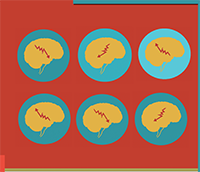
7 mars 2014
Neuroeconomics workshop
En savoir plus...
A VENIR

7 mars 2014
Neuroeconomics workshop
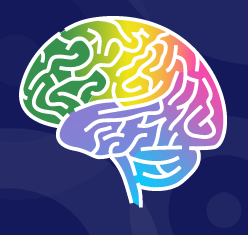
Du 11 au 14 mars 2014
Semaine du cerveau 2014 - Conférences à l'ENS, 19h salle Ferry
11 mars - Bruno Dubois (Directeur de l'Institut de la Mémoire et de la Maladie d'Alzheimer): "J'ai la mémoire qui flanche"
12 mars - Franck Ramus (LSCP): "Le point sur l'autisme"
13 mars - Sophie Deneve (GNT/LNC): "Du bruit dans le cerveau?"
14 mars - Jean-Michel Lemée (Médecin, Département de Neurochirurgie, CHU Angers): "Chirurgie et cerveau au XXIe siècle"
Voir le site internet de la Semain du cerveau 2014

13 mars 2014
17e Journée Nationale de l'Audition

6, 9, 13, 15 mai 2014
Prix et Conférences Jean Nicod
Retrouvez l'intégralité de l'agenda de l'Institut d'étude la cognition sur le site de l'IEC.
